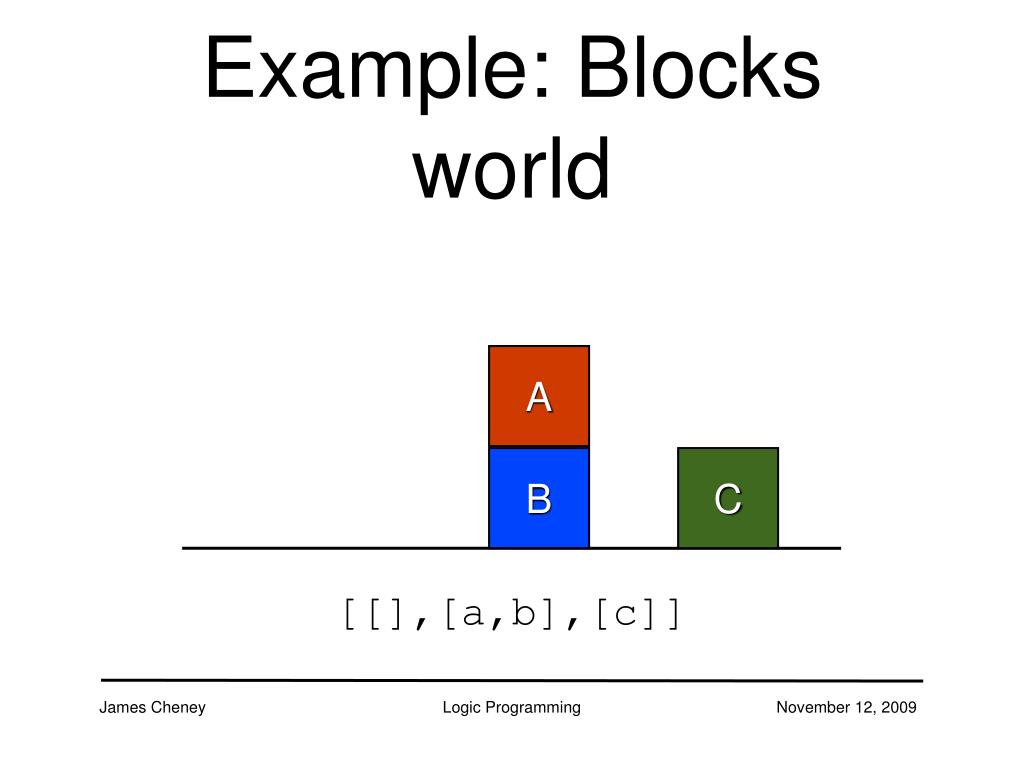
After finishing such task, you must test the availability of Intel® C++ Compiler by typing in your terminal: cd icc -version The installation is very straight-forward, and it does not require many comments to be made. Intel® Data Analytics Acceleration Library (Intel® DAAL).Intel® Threading Building Blocks (Intel® TBB).Intel® Math Kernel Library (Intel® MKL) for C/C++.It is recommended that these components also be installed to allow further use of such performance libraries in subsequent projects.
#Block world problem using prolog full#
install_GUI.shĪlthough you may prefer to perform a full install, this article will choose a custom installation with components that are frequently useful for many developers. Open the terminal and then choose the graphical installation: cd. tgz file, you will obtain a folder called parallel_studio_xe_2017update4_cluster_edition_online (or similar version).
#Block world problem using prolog install#
The most convenient way to install Intel tools is downloading and installing Intel® Parallel Studio XE 2017. Extracted from Intel® Parallel Studio documentation 1. Figure 1 shows a flow chart describing how the various Intel tools help you in several stages of such optimization task.įigure 1: Optimizing performance flowchart and libraries. Optimizing performance on hardware is an iterative process. Different operating systems may require minor changes. The following description uses a system equipped with: Intel® Core™ i7 GHz processor, 64 bits, Ubuntu 16.04 LTS operating system, 8GB RAM, and hyper threading turned on with 2 threads per core (you may check it by typing sudo dmidecode -t processor | grep -E '(Core Count|Thread Count)'). Building Prolog for Intel® Architectureġ. An experiment with a classical AI problem is also presented. The two main products used are Intel® Parallel Studio XE Cluster Edition and SWI-Prolog interpreter. Prolog and similar programming languages are valuable tools for solving such problems.Īs it will be detailed below, this article proposes a Prolog interpreter recompilation using Intel® C++ Compiler and libraries in order to evaluate their contribution to logic based AI. Hence, it is not feasible to believe that next generations of learning systems will be developed without high-level descriptions, and thus it is expected that some problems will demand symbolical solutions. Despite machine learning systems success over the last two decades, the place for traditional AI has neither disappeared nor diminished, especially in systems where it is necessary to explain why a computer program behaves the way it does. This article aims to explore what happens when Intel solutions support functional and logic programming languages that are regularly used for AI. For instance, there are several machine learning systems written in Python* simply because the mathematical support is available as libraries for such programming language. Any language that facilitates writing vector algebra and numeric calculus over an imperative paradigm works just fine. Once there is no high-level modeling, the process is called Brain Centered.

Machine learning, on its turn, is associated with low-level mathematical representations of systems and a set of training data that lead the system toward performance improvement. Commonly, some kind of (backward or forward) logical inference is needed. This kind of manipulation is often associated with expert systems, where high level rules are often provided by humans and used to simulate knowledge, avoiding low-level language details. Knowledge Reasoning’s strategy is usually developed by using functional and logic based programming languages such as Lisp*, Prolog*, and ML* due to their ability to perform symbolic manipulation. However, while machine learning is an approach to AI based on algorithms whose performance improve as they are exposed to more data over time, Knowledge Reasoning is a sibling approach based on symbolic logic. Both machine learning and Knowledge Reasoning have the same concern: the construction of intelligent software. A lot of buzz talks over Internet which suggests that machine learning and Artificial Intelligence (AI) are basically the same thing, but this is a misunderstanding.


 0 kommentar(er)
0 kommentar(er)
